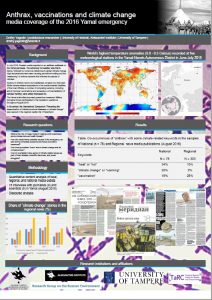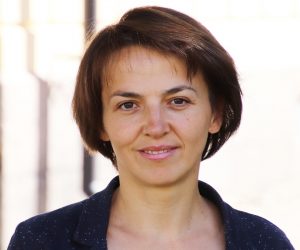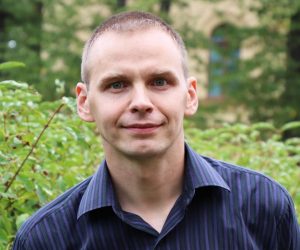This summer two new postdoctoral researchers have joined our Research group on the Russian environment. Alla Bolotova is taking part in the Wollie project, and Dmitry Yagodin researches the role of journalism and media in climate change discourse in Russia. We are delighted that these two excellent experts became a valuable addition to our group and would like to introduce them to you.
Alla and Dmitry, in their own words
Please tell about your new position and your path to it; what is your researcher project about?
Alla: I have started my work at the Aleksanteri institute in June 2018 for the project ”Live, Work or Leave? Youth – wellbeing and the viability of (post) extractive Arctic industrial cities in Finland and Russia”. Previously I have worked in a number of research and consultancy projects on youth in industrial towns in the Russian Arctic, mostly in the Murmansk region, that is why my work for the Wollie project will be partly built on my existing expertise. My main tasks in the project are to conduct fieldwork in several industrial cities in the Russian Arctic and to write and publish academic articles in peer-reviewed journals.
Currently I am working on an article in which I analyse corporate responsibility programs of different companies working in Arctic industrial cities focusing on their implementation. This article deals with the question how young people perceive and use such programs for realisation of their life strategies, initiatives and projects. I focus on several projects initiated by young people in industrial cities in Murmansk region aiming to create new kinds of public places, different from the official soviet-style leisure opportunities, which are not relevant for youth anymore. Such projects, like independent youth clubs, music clubs, open meeting spaces, time-cafés, often try to get support from the local company and administration, however realisation of similar projects in different cities can be quite different because of varying social policies of companies and administrations.
Dmitry: In August 2009, the Aleksanteri Institute opened ten 4-years-long paid positions in their doctoral school. I was already beginning my second year of PhD writing in Tampere. With my topic – “the Russian political blogosphere” – it was quite natural to apply to one of the largest research centers specializing on Russian and East European contexts. So I did. First, I was short-listed for a formal interview later in the Autumn. Later, I was lucky to be selected, offered the job (or accepted as a paid researcher) to pursue with my doctorate.
The formal duration was from the beginning of 2010 till the end of 2013. At that time, doctoral schools allowed staying at one’s home universities, maybe they still do. This gave me the generous opportunity to work, socialize and benefit from two research sites at the same time. I felt financially secure, could focus on my main tasks. More importantly, I think retrospectively now, the school introduced me to other disciplines, which wouldn’t be easy in a single discipline department where I was based originally. Seeing historians, literary scholars, political and cultural scientists, learning from very dissimilar ways of doing research, eventually, helped me to find my own place. It has equipped me with a metaphorical map and compass to navigate across the dense forest of academic world.
So I spent 4 years with the Institute, participating in its various academic and social events, with most memorable being, of course, the famous summer school on Aland Islands. I have been there three summers in a row, and every time it felt as a boost of energy and motivation to excel in what you are paid for. The important part of that experience came from meeting many talented and inspiring teachers and fellow students. Many of us have developed strong friendship relations.
Now some years later, I feel my return to Aleksanteri was already mystically programmed by that experience. Obviously, I followed the market, looking for open calls and going through competitions. It wasn’t only that I chose this job, the job chose me. My new job that began this September is a happy development in my career and I feel indebted to not only work for my own research interests, but, perhaps, to pay back for what I experienced in the doctoral school myself, to inspire and motivate others.
My current research has a working title “Climate change discourse in Russia”. The topic is quite broad, and I approach it from the point of view of journalism practice and mediatization theories. Journalism plays an important role in explaining abstract scientific ideas and complex environmental problems to the publics. Mediatization forces all kinds of climate-related stakeholders into active use of media channels, communicative strategies and discursive practices. This nexus of journalism and mediatization (of climate science, environmental groups, politics and businesses) is my entry point to the study of “climate change discourse”. The general question that I investigate is how the knowledge about climate change enters public sphere locally and globally with Russia as the main context. I study local discourses on the example of the Arctic regions that scientists believe are some of the most vulnerable to climatic change. In the international or global discourse, Russia (due to its vast territory, science, fossil fuel industry and geopolitical ambitions) is among central players. My primary research methods are content analysis and interviews. I often combine quantitative and qualitative methodologies. More specific questions are related to communication practices asking, for example, what happens to traditional practices under the influence of mediatization, how digital media change what journalists or scientists do and can do to shape the climate change discourse, what slows down or limits the climate change debate.
In the beginning of September you have taken part in the UArctic Congress. Please tell something about the work you presented there.
Alla: My paper for the UArctic Congress is connected to one of the projects I was involved during my work at the Centre for Arctic Social Studies, European university at St. Petersburg. The project is realised in 2017-2019 in cooperation with the Tumen’ state university and entitled “Russian harbors of trans-arctic route: space and societies of Russia’s Arctic coast on the eve of a new period in the history of Northern Sea Route (NSR)”. In this project I conducted fieldwork in two important ports connected with the NSR , namely Murmansk and Archangelsk, and my presentation at the UArctic congress is based on interviews conducted with experts and representatives of various organizations working on the Northern Sea Route. In this paper I consider how ice can be analysed as material environment included into socio-technical systems.
Dmitry: My poster presentation at the UArctic Congress is based on a pilot case study. I started with monitoring the national Russian media and the local and regional media in Yamal to see how the events of 2016 (anthrax outbreak) developed, who were the main speakers or newsmakers, what decisions were made. Between August 18th and 26th, I traveled to Salekhard, the capital of Yamalo-Nenets Autonomous Okrug, to conduct interviews with local journalists and scientists to talk about their memory of those events, their professional opinion on how the story unfolded, what were the roles of media and scientific community. In total I conducted 18 semi-structured interviews ranging from 40 to 90 minutes. I didn’t have time nor contacts then to interview local authorities. This is the task for the future. Along with talking about the specific event, I also interviewed respondents on a number of questions related to climate science, climate reporting, environmental and science communication.
Abstract:
Anthrax, vaccinations and climate change in the media reports of the 2016 Yamal emergency
In July 2016, Russian media reported on an anthrax outbreak on the Yamal peninsula. The extremely hot weather was first to blame, followed by numerous references to global climate change. High temperatures were seen causing permafrost melting and the “awakening” of anthrax bacteria that infected thousands of reindeer. Dozens of children had to be hospitalized, at least one child died. While climate-related explanations in the media lowered liabilities of the local officials, a number of competing versions, including about improper vaccinations and excessive commercialization of reindeer herding, were widely discussed too. Based on the content analysis of local, regional, and national media outlets, this study clarifies the role of mass media in raising public awareness about climate-induced health threats. I use methods of discourse analysis to investigate the ways media had framed potential causes of the emergency, as well as the immediate solutions and future preventive measures. My research looks at these aspects from a standpoint of communication policy networks wherein a guiding theoretical question is how local public issues transform into media and policy agenda, potentially also rearticulating the problem of climate change. Previous research has shown quite convincingly that environmental journalism and especially the theme of climate change are at a rather low level in the professional and news hierarchy of Russian media. This is particularly visible in the results of international comparisons.
Dmitry Yagodin’s Poster for the UArctic Congress
What do you think makes your research especially relevant and important nowadays?
Alla: Considering the attention that Arctic gets both on the global level and in Russia there is a definite lack of social science research on the Arctic. There is a wide spread exoticism of this region: Arctic is commonly imagined as uninhabited wilderness, pristine territory full of natural resources but without people. This is far from the reality: there are 2,5 million people inhabiting the Russian Arctic that is more than half of the population of the global Arctic. People live and work there, and have very different connections to the territory and to the environment, so I see my task as social scientist to contribute to better understanding of modern social processes in the Arctic.
Dmitry: Climate change is among several most urgent, global, controversial and politicized topics that the humanity is facing now. According to many estimations, the Arctic is warming at least two times faster than the rest of the Earth – the changes are already very visible and devastating. The anthrax accident is just one recent evidence of what could and will most probably be happening. Large parts of the Arctic belongs to Russia, where environmental discourse and climate change are not effectively present in modern politics. Similarly, journalists in Russia are not interested, just as their audiences, to learn, talk and help with such issues. This is why it is important to study how climate change discourse is produced, what can help its quality and policy efficiency.
Dear Alla and Dmitry, welcome to our research group, we are looking forward to a fruitful cooperation!



One Reply to “Two new postdocs in our research team”
Comments are closed.